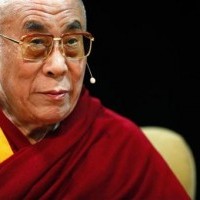by Mark Egan, Reuters
His Holiness the Dalai Lama on Sunday urged Americans to visit his homeland to disprove China’s assertion that people are happy there.

Speaking in Manhattan, His Holiness said Beijing insists, “Tibetans are very happy.”
“The Chinese government never admit, never acknowledged there is a problem,” he said. “So now I think the world community has a responsibility to show the world there is a problem.
“If the majority of Tibetan people are happy, then our information becomes wrong, then … we must apologize to the Chinese government,” His Holiness the Dalai Lama said to laughs from the audience of 1,500 people.
Noting China cast itself as a liberator of Tibet rather than as a colonialist, he said, “A liberator should not bring more misery.
“So please, you, non-Tibetans, go there … and then you must show it to the world,” His Holiness said, “I urge you, please go there.”
On April 23, China urged the United States not to let the Dalai Lama, whom Beijing brands a separatist, visit the country. “We oppose the Dalai Lama going to any country to engage in splittist activities under any pretext,” said Foreign Ministry spokeswoman Jiang Yu.
His Holiness the Dalai Lama’s Sunday event was a conversation with former Irish President Mary Robinson.
Robinson, also a former United Nations Human Rights Commissioner, called the lack of progress on human rights in Tibet, “heartbreaking from a human rights point of view.”
His week-long trip to the United States included a variety of events in California, Boston and New York but does not include a meeting with President Barack Obama.
–The above report is reproduced from the Reuters’ website on 3 May 2009
